2017
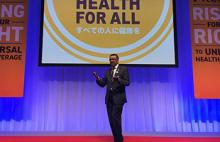
Half the world lacks access to essential health services, 100 million still pushed into extreme poverty because of health expenses
The historic Universal Health Coverage (UHC) Forum in Tokyo between 12-15 December culminated in a declaration to galvanize action toward #HealthforAll.
- UHC Forum
- News release
- Tokyo Declaration
pdf, 430kb - Together on the road to universal health coverage (Japanese translation) Chapter 1, Chapter 2, Chapter 3
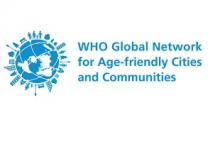
Capacity Building to Establish a National Network of Age-friendly Cities and Communities in Japan
Japan has the oldest population in the world. Yet, until very recently, only two municipalities in Japan had joined the Global Network – Akita City in 2011 and Takarazuka City in 2016. Growing awareness and interest among local governments in Japan has seen that number grow, with the addition of 19 towns and cities from Kanagawa Prefecture, Japan, to the Global Network in October 2017. Good practices and insights from Japan would make a valuable contribution to all members of the Global Network. In turn, local governments in Japan could benefit from connecting to the Global Network and tapping into its wealth of knowledge, experiences and resources, as well as gain global recognition for their efforts.
On 4-5 December, 2017, the WHO Kobe Centre will organize a 1.5-day, invitation-only workshop on Age-friendly Cities and Communities. Officials from nine local governments will attend. The emphasis will be on developing the capacity of prefectural governments to support municipal governments’ participation in the Global Network and to lead the establishment of a National Network of Age-friendly Cities and Communities.
The workshop will consist of presentations by WHO staff, who will give an overview of the i) WHO Global Strategy and Action Plan on Ageing and Health, ii) Age-friendly Cities and Communities initiative, and iii) Global Network. Guest speakers representing the city governments of Akita and Takarazuka will share their experiences as members of the Global Network, and the prefectural government of Kanagawa will talk about its recent activities as an affiliate of the Global Network and how it supports its municipalities to participate in the Global Network.
Related links
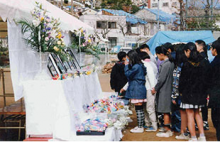
Long-term Psycho-social Impact of Natural Disasters on Survivors in Japan
In practice, the majority of attention to DRM has focused on preparedness and response. On the other hand, the long-term psychosocial impact and needs of survivors during the recovery phase have not been well documented nor have there been studies of evidence about possible interventions.
WHO Kobe Centre (WKC), in cooperation with the National Center for Neurology and Psychiatry (NCNP) and Hyogo Institute for Traumatic Stress, has brought together 21 Japanese experts to work on a comprehensive review of DRM in Japan with a focus on psycho-social interventions.
The expert consultation was held in February 2017. WKC in collaboration with NCNP is currently implementing a national survey to clarify current known and unknown factors for better psycho-social management after disasters. The results of the survey will be analysed and published including policy suggestions for 2018.
“The outcome of this project is expected to contribute to identifying the action areas for investment and to help improve the quality of life for disaster survivors over the long-term,” said Dr Ryoma Kayano, technical officer at WHO Kobe Centre.
The project will:
- Identify fundamental gaps in knowledge and required actions in long-term psychosocial management for disaster survivors.
- Contribute to evidence-based policy options for better long-term psychosocial management after disasters.
- Provide scientific evidence for health emergency and disaster risk management by sharing lessons and evidence from Japan.
Research brief for printing
Related links

World Diabetes Day, 14 November
The theme of World Diabetes Day 2017 is Women and diabetes – our right to a healthy future. This theme emphasizes the importance of affordable and equitable access for all women at risk of or living with diabetes to essential medicines and technologies. It highlights special concern on pregnant women who require adequate access to screening, care and education to achieve positive health outcomes for both the mother and child. The theme also encourages women and girls to lead healthy lifestyles to improve the health and wellbeing of future generations.
There are currently over 199 million women living with diabetes, and with 2.1 million deaths per year diabetes is the ninth leading cause of death in women globally. Strengthening health systems and paying attention to the specific needs and priorities of women are required to combat this disease.
Related links
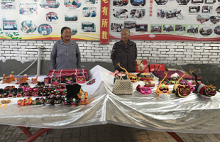
Consultation on community-based social innovations for healthy ageing (CBSI)
From 17 to 18 October 2017, 18 experts and researchers were convened to participate in a consultation on community-based social innovations (CBSIs) for healthy ageing.
The research on CBSIs had as its starting point the key question of how older people can become a resource for themselves and their peers. This research also explored links these people had with local health and care systems.
WKC’s research project on CBSIs started in 2014. The consultation this past October is a key milestone in the second phase of the research, which was implemented by RAND Europe with the support of local partners in several countries.
The goals of the consultation were to review preliminary findings from a systematic review conducted on CBSIs in middle- and high-income countries in order to establish a proposed typology for CBSIs and to articulate CBSIs within the health and social systems of the respective countries.
The participants, who represented the diversity of the countries in which the research has been conducted, also reviewed the findings of 10 case studies conducted in Chile, China, India, Iran, Lebanon, Poland, Russia, Serbia, Thailand, and Viet Nam.
After two days of rich debate and knowledge exchange, the participants identified key parameters for scaling up and sustainability as well as mechanisms and systems that are needed to assess the impact of CBSIs on healthy ageing.
The consultation also provided space conducive for knowledge sharing about the particular lessons that can be gathered from each specific CBSI. Ideas around virtual networks and platforms of knowledge exchange were also discussed to ensure the dissemination of knowledge within CBSIs and beyond.
The concluding session highlighted the importance of research on CBSIs and perspectives on how this research can be used by policymakers to realize SDGs in the observed communities and support a UHC agenda.
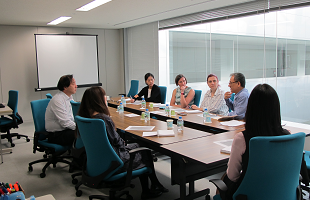
Related links
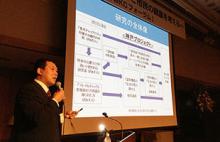
WKC Forum report “Think about Health For All with the WHO Kobe Centre”
In commemoration of the establishment of “Health Innovation City Kobe,” on September 23, WHO Kobe Centre held a joint WKC Forum with Kobe City entitled, “Think about Health For All with the WHO Kobe Center.” This forum was held in the Kobe Port Pia Hotel, and drew the attendance of approximately 150 members of the general public.
The forum’s first session began with an address from Mr Kizo Hisamoto, Mayor of Kobe City. Following that, Dr Sarah Louise Barber, Director of WHO Kobe Centre gave a presentation entitled, “WKC’s New Research – UHC, Innovations, and Aging.” During her presentation, Dr Barber said, “A key message from Japan is about early intervention and health promotion. In 1950, the average age in Japan was just 58. Around that time, Japan’s approach was to a combination of public health policies and personal care treatment to promote stroke prevention measures. As a result of all of that, Japan now has the highest average lifespan of any country in the world. It is important that there be a good combination of leadership from the government that enables action by the people. The world is watching to see how Japan will act, since it is farther along on its shift toward an older population compared to other countries. WHO Kobe Centre will continue to communicate to the world about this issue through our research.”
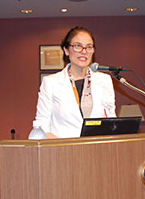
After Dr Barber’s presentation, Dr Ryoma Kayano, Technical Officer at WHO Kobe Centre, gave a presentation on the topic of the “Kobe Dementia Study.” Dr Kayano noted that alongside the aging of the global population, it is now expected that 130 million people will be living with dementia by 2050. He pointed out that “since there is not yet a cure for dementia, figuring out how to respond to the increasing medical and nursing care burdens that dementia places on society is a global issue.” He expressed his hopes for the Kobe Dementia Study , stating, “Through our joint research with Kobe University based on our collaboration with Kobe City, I want to propose a community-based model for the early detection and management of dementia.”
Next, Prof Kiyoshi Maeda, Director of Kobe City Dementia Countermeasures (and Professor at Kobe Gakuin University), gave a presentation on “Kobe City’s Approach on Dementia.” Prof Maeda introduced the initiatives of Kobe City for focused support during the early stages of dementia, as well as the measures that Kobe City is promoting to create dementia-friendly communities.
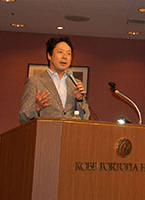
Lastly, Prof Koji Kawakami of Kyoto University gave a presentation entitled, “Life-long and Health Promotion.” During his presentation, he introduced his research using national municipal-level data from across Japan, explaining, “If we can organize health data from an early stage of each person’s life into ‘life-course’ level big data, it will be possible for each municipality to gain a clear understanding of the health issues their communities face, and make it possible to develop effective health policies.”
Presentation (Japanese)
Forum flyer (Japanese)

WKC Forum: “Think about Health For All with the WHO Kobe Centre”
A longer life brings with it many opportunities -- such as taking up new –education, study, or even a work career. Yet, the extent of these opportunities and contributions depends heavily on one factor: health. Will people remain healthy as they age? Promoting healthy ageing and staying healthy requires policies and legislation that create healthy environments and communities – environments that enable people to easily make healthy choices.
City of Kobe just launched a new policy of “Health Innovation City Kobe” in July 2017. They established the network for “Health Innovation City Kobe” through councils consisting of academia, professional organizations, local governments, and the private sector. The policy targets prevention of disease by using big health data, and increasing health literacy through capacity building programmes. WKC is a part of this important network.
As part of the kick-off event of the new policy, WKC and Kobe city are jointly organizing an open public forum on September 23, 2017, at Kobe Port Pia hotel. Dr Sarah Louise Barber, Director, and Dr Ryoma Kayano, Technical Officer, WHO Kobe Centre, will talk about WKC’s new programs of research.
Free of charge. Registration is required. (Kobe city registration desk Tel: 078-333-3372)
“Think about Health For All with the WHO Kobe Centre”
Time:23 September 2017 (13:00-17:00)
Venue:Kobe Portpia Hotel
10-1, 6 Chome, Minatojima Nakamachi, Chuo-ku, Kobe, 650-0046, Hyogo
TEL 078-302-1111
Organized by:WHO Kobe Centre and Kobe City
Programme:
13:30-14:00
Opening
Mr Kizo Hisamoto, Mayor, City of Kobe
14:00-15:50
“WKC’s new research – UHC, Innovations, and Ageing”
Dr Sarah Louise Barber, Director, WHO Kobe Centre
“Kobe Dementia Study”
Dr Ryoma Kayano, Technical Officer, WHO Kobe Centre
“Kobe City’s approach on Dementia”
Prof Kiyoshi Maeda, Kobe City (Kobe Gakuin University)
15:50-17:00
"Health Innovation City Kobe"
Prof Haruhiko Kikuchi/Chair, Council for Health Innovation City Kobe
"Life-long and Health Promotion"
Prof Koji Kawakami, Kyoto University
17:00
Closing
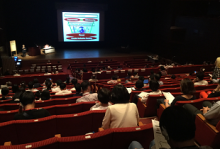
WKC Forum report “Role of Assistive Technology in Rapid Ageing in Asia and the World”
Assistive Technologies are an important support for ageing populations in Asia and the rest of the world. They allow disabled and non-disabled ageing people to engage in activities that are meaningful or simply necessary for them to stay healthy and socially included.
The WHO Centre for Health Development (WKC) in cooperation with i-CREATe 2017, and the 32th Japanese Conference on the Advancement of Assistive and Rehabilitation Technology in KOBE, organized a WKC Forum on the Role of Assistive Technology in Rapid Ageing in Asia and the World, on Thursday, 24 August 2017 at the Kobe International Conference Center. Dr Takaaki Chin, the General Chair of the 11th International Convention on Rehabilitation Engineering and Assistive Technology (i-CREATe 2017). Introduced Dr Sarah Louise Barber, Director of WHO Kobe Centre for opening remarks for welcoming the 200 participants in the WKC Forum.
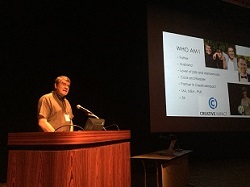
Ageing in place policies require human and technological support, and the balance between the use and deployment of these two forms of support can be characterised by people’s wishes to be taken care of by humans, and local government favouring a mix of human and robotic care to reduce costs and compensate for the lack of workforce to deliver quality long-term care support to older adults. At the heart of these choices are the questions of dignity and autonomy of older people. Several examples of companies developing robotic devices and human-based services were used as examples of the complementarity of these approaches. In conclusion, Mr Hjorth emphasized the need to engage older people (to allow for the co-creation of care models) and to pay attention not only to the financial side, but also to quality of life as an important parameter of policy choice.
The keynote was followed by three presentations on the importance of and examples of the use of assistive technologies for disabled people, as they can serve as a blueprint for how these technologies can be developed, adapted and co-designed with their user to meet the needs of ageing populations.
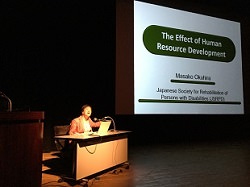
Mr Hiroyuki Shinoda from the SAKURA Wheelchair Project, and Mr Kazushi Matsumoto from the Asian Seating Assistance Project (ASAP) highlighted the specific challenges of North-South collaboration to support users of wheelchairs and explore the limits of classic donation of assistive technologies versus the benefits of embedding technical assistance to meet the needs of users.
The WKC Forum was conducted in English with simultaneous Japanese and Sign Language interpretation.
Presentation
Forum flyer
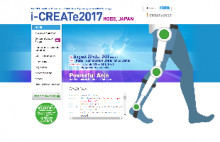
WKC Forum “Role of Assistive Technology in Rapid Ageing in Asia and the World”
The 11th International Convention on Rehabilitation Engineering and Assistive Technology (i-CREATe 2017) to be held on August 22–24, 2017 in Kobe. The i-CREATe will be featuring innovative technology, equipment, applications, techniques and materials applied in the field of Assistive & Rehabilitative Technology. It is also a stage for technical exchanges to share ideas and best practices in the disabilities field from across the countries.
Taking this great opportunity, WKC will organize a half-day WKC forum and invites Mr Henrik Hjorth, Director, Creative Impact, Copenhagen, Denmark, as a keynote speaker. Mr Hjorth is currently Senior Consultant in several EU-funded projects and bilateral projects focusing on institutional building and related labour force awareness raising.
Free of charge. No registration necessary.
Role of Assistive Technology in Rapid Ageing in Asia and the World
Time:24 August, 2017 (13:00-15:00
Venue:Kobe International Conference Center 1F Main Hall
(〒650-0046 Minatojima Nakamachi 6-9-1 Chuo-ku Kobe TEL 078-302-5200)
Language:English–Japanese simultaneous interpretation available
Organized by:WHO Kobe Centre, i-CREATe2017, The 32th Japanese Conference on the Advancement of Assistive and Rehabilitation Technology in KOBE
Programme:
13:00-13:05 Opening
Sarah Louise Barber, Director, WHO Kobe Centre
13:05-13:50 Lecture
“Assisted Living in a Danish Perspective – with special focus on the ageing population and related challenges”
Henrik Hjorth (Creative Impact, Denmark)
13:55-14:55 Reports by Practitioners: Support for Independent Living using Assistive Technology
"International cooperation to support independent living in Asia utilizing Assistive technologies"
● Masako Okuhira (Expert on International Relations, Japanese Society for Rehabilitation of Persons with Disabilities, Japan)
● Hiroyuki Shinoda (Lecturer on Seating Engineering, Sakura Wheelchair Project
● Kazushi Matsumoto (Executive Director, Asian Seating Assistance Project (ASAP), Japan)
14:55-15:00 Closing
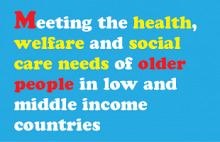
Meeting the health, welfare and social care needs of older people in low and middle income countries
This call for papers is jointly organised by the journal Health Policy and Planning and the WHO Kobe Centre for Health and Development (WKC), with the support of the WHO Health Workforce Department,the WHO Service Delivery Department, and the WHO Ageing and Life course Department. It is financially supported by the WHO Kobe Center.
The title of the supplement is Meeting the health, welfare and social care needs of older people in low and middle income countries (LMICS) through innovations and enhanced human capital.
Inviting empirical research on innovations in meeting the health, welfare and social needs of older populations in low and middle income countries, and relevant research from high-income countries that is transferable across settings (with use of technology as a particular cross-cutting theme).
Papers speaking to each of the sub themes listed below will be targeted.
- The design, organisation, and financing of health and social care systems
- Transformative strategies and investments for health and social workforce planning, education, skills and the creation of decent jobs
- Innovations to empower older people in maintaining optimal functional ability
The supplement will have a maximum of 15 articles that cover the sub-themes (i.e. approximately 5 papers per sub theme). All papers will be subject to peer review. It is our aim that 75% of accepted papers will be led by authors from low- and middle-income countries. Selected authors will be invited to submit a full manuscript for peer-review. Accepted papers will be published as a special journal supplement in 2018. Full manuscripts should be submitted to Health Policy and Planning by 31 October 2017 through the submission link on the journal website.
During the submission process please note your paper is to be considered as part of a special issue.
Original research articles as well as review papers are invited
Read the full author instructions
Please contact the editorial office if you have any further enquiries.

